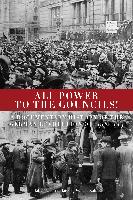Presenting English translations of manifestos, speeches, articles, and letters from the German Revolution, this is an informative look at early 20th-century Germany. After defeat in World War I and the end of the "Kaiserreich," ""radicals across Germany rallied to a socialist slogan, "All Power to the Councils!" Many documents, such as the anarchist Erich Musam's comprehensive account of the Bavarian Council Republic, are made available in English for the first time. Also included are appendices portraying the Red Ruhr Army that repelled reactionary Kapp Putsch in 1920, and the communist bandits that roamed Eastern Germany until 1921. This documentary history provides a dynamic and vivid picture of both an encouraging and tragic time with long-lasting effects for world history.

